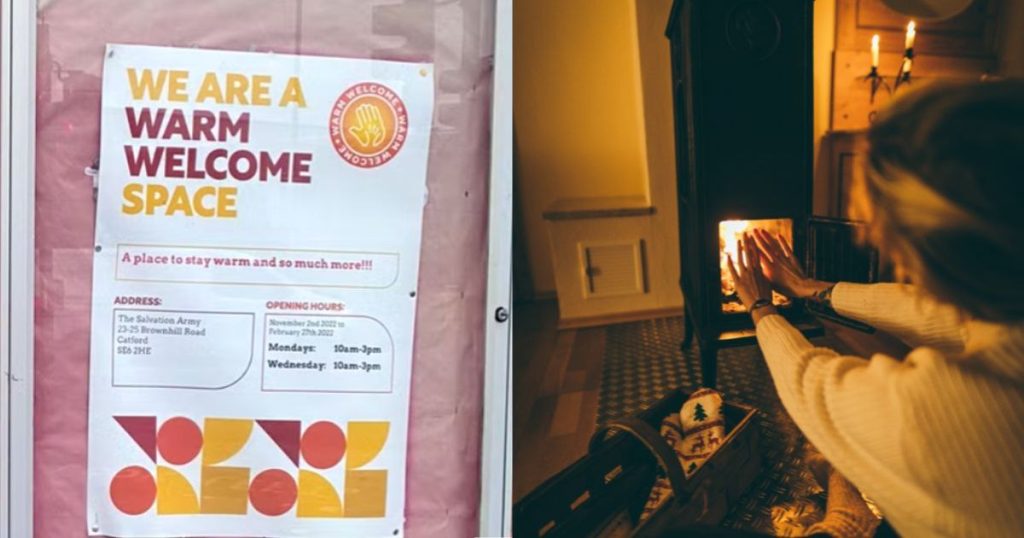As many people in the UK struggle to make ends meet due to skyrocketing energy costs, more than 3,700 “warm banks” have opened their doors. However, what exactly are “warm banks,” and why are so many popping up in the UK?
If a person cannot afford to turn on the heaters in their home, they can go to a warm bank to warm up for free.
The official Warm Welcome Campaign website states that there are currently 3,723 such warm banks. The guiding online map on the website illustrates the widespread demand for warm banks this winter. Additionally, they state that entry to these banks will be free, and they will serve simple beverages like tea or coffee.
According to the World Economic Forum (WEF), community organizations, councils, and charities around the nation organized the warm banks. More than 50% of councils in England and Wales, according to the research, “are actively building up warm banks or providing support to the groups that are doing so.”

It follows the UK’s around 80% increase in its energy price cap on October 1 that brought the country’s average annual energy bill to £3,500 (approx.).
In the interim, the government is providing some bill credits and is aiming to speed up domestic low-carbon energy production to reduce costs over time.
As per data from the UK government, the cost of living has increased significantly since early 2021, according to a CNN report. The same study discovered that domestic gas and electricity prices rose by 128% and 67%, respectively, from October 2021 to October 2022.
This winter, 16.4 million people will be forced to live in fuel poverty, according to a report.
The cost-of-living crisis in Britain is about to worsen, according to a report by the Associated Press, with millions of citizens paying about 80% more a year for their residential energy bills.
To pull the nation out of a recession that the Office for Budget Responsibility predicts will last little over a year and shrink its economy by just over 2.1%, UK Prime Minister Rishi Sunak and Finance Minister Jeremy Hunt announced increased taxes and decreased public spending in November.
According to the Office for National Statistics, the UK is the only G7 country whose economy has shrunk since the coronavirus pandemic.
Winter Fuel Payment Program

The UK government has announced an Energy Bill Support Scheme worth £400 per household entitled to benefits, which will partially subsidize domestic energy bills from winter 2022 to 2023.
This will also provide additional financial assistance to help pensioners pay their energy bills this winter under the Winter Fuel Payment program.
Everyone eligible will receive a letter outlining their eligibility and automatically receive the winter fuel payment. One may need to file a claim if anyone doesn’t receive a letter but considers themselves eligible.
Pensioners can receive between £150 and £300 to assist with winter heating costs. Additionally, they will receive a one-time pensioner cost of living payment of £300 this winter, which will be added automatically to their winter fuel payment.
Also Read |UK medical bodies say winter crisis costing lives
Warm Bank: A Shield against Rising Economic Challenges
The recession and rising interest rates present an economically toxic combination for Britain. While consumers experience rising prices and declining real incomes, the Bank of England is working to control double-digit inflation.
After Liz Truss, the outgoing leader, spooked the bond market with her proposal for unfunded tax cuts and an expensive energy price guarantee, forcing the Bank of England to step in, Britain must regain its credibility in the international financial community.
The present prime minister, Rishi Sunak, will likely have to oversee spending cuts and tax increases to balance a budget shortfall made worse by the crisis’s increased borrowing costs. This financial statement is due on October 31.
Also Read | Mental Health: Still Coping With Stigma And Discrimination
This comes as the government is under pressure to assist struggling households through a difficult financial crunch, with rising mortgage costs on top of rising food, fuel, and heating costs brought on by the conflict in Ukraine and other international factors.
There are worries that the cold may pose a health risk or possibly be fatal to vulnerable populations if they cannot afford to heat themselves because many households anticipate having to make difficult financial decisions throughout the winter.










I love the way you articulated this topic. I know it will help a lot of people understand it better like me
All these new articles are so much productive for me. I learned a new word today (#warmbank). Thank you for making this site #metaviews team